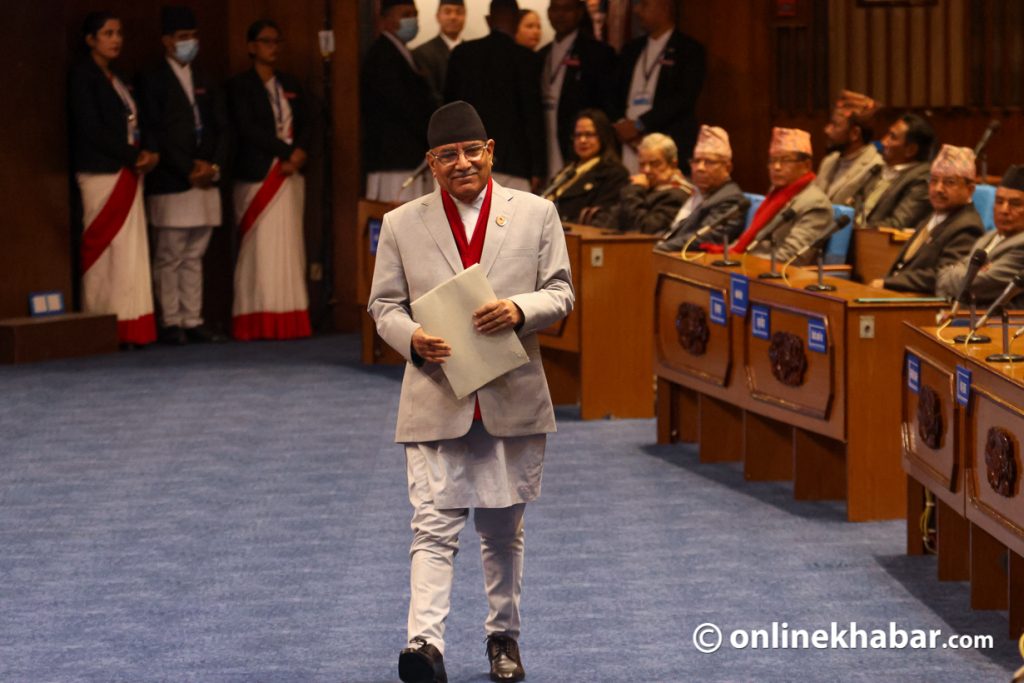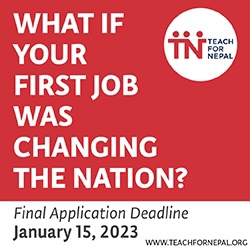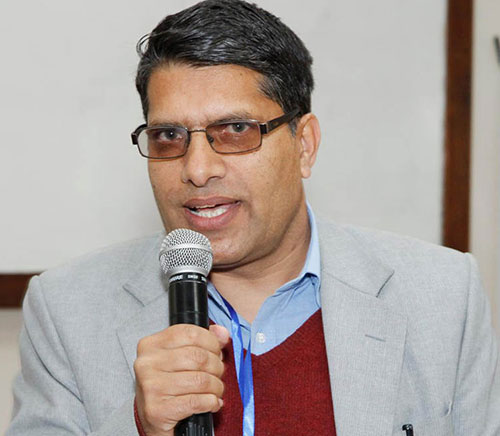View of the arithmetic obtained in the elections held last November, it created a weak parliament. Due to the mixed electoral system adopted by us, it is difficult for a single party to form a majority government. Previously, it was possible to form a government when at least two parties came together, but this time, it was not possible to establish a majority without a coalition of five or seven parties.
The 'Hung Parliament' in
vogue in the parliamentary system has been turned into a 'Super Hung
Parliament' by this election result. Even more strangely, Pushpa Kamal Dahal
Prachanda has got the opportunity to become the prime minister with the
strongest support even in such adverse conditions. This article discusses the
challenges and opportunities of the strong Prime Minister Prachanda in this
weak parliament.
A strange picture appeared in the
arithmetic of the Parliament this time. Compared to the previous elections, the
number of voters increased while the votes of established parties decreased.
Newly registered parties received such an unexpected vote that they succeeded
in becoming national parties in their first attempt. On the other hand, CPN
Unified Socialist, which was elected by the largest party in the parliament,
has failed to become a national party. The goal of the Congress-led ruling
coalition that formed a five-party alliance was to weaken significantly the UML,
which had reached the opposition. As internal unity could not be strengthened,
the ruling coalition could not even come close to its goal.
On the other hand, the arrogance
of the UML, which was inflamed in the parliamentary elections by dissolving the
parliament twice in 6 months, would have entered the lion's palace with a
majority. The election results also dashed the hopes of the UML, which started
the election campaign by announcing the future prime minister. They commented
that the new independent parties won't win a single seat.
What's more, the new parties
entered the elections with the announcement of the future prime minister and
insulting greatness. Overall, no one is satisfied with the results of this
election. The truth is that no one's goals were fulfilled by this election. A
weak parliament in which no one is satisfied is in danger of being attacked by
anyone at any time. Glimpses which have started appearing in the early
days.
Another unexpected event like the
election results was that a weak parliament gave a strong prime minister. The
Prime Minister received an almost unanimous vote of confidence, contrary to the
expectations of a thin majority government and a thin vote of confidence. This
has become a strange phenomenon in Nepali politics.
However, less than a month after
receiving the vote of confidence, the race for the chair has already started.
Those who supported him remained in the opposition because they did not get the
ministry of their choice, while those who went to the government left the
government for the same reason. This is not a good sign for political
stability. But the positive thing is that this government has received a vote
of confidence from both the ruling party and the opposition.
Even after the establishment of
the Federal Democratic Republic, it is a matter of general discussion that the
conduct and behavior could not be adapted to it. It has been established that
even though the system has changed, the situation has not changed, and even
though the character has changed, the tendency has not changed, because the
structure envisioned by the constitution and the officers in charge do not
behave accordingly.
As a result, the government has
become a musical chair. Bargaining opportunities for the parties that joined
the government have weakened. There is an added concern that if my party
withdraws its support, another party will participate in the government. As
soon as someone leaves the chair of the government, the parties are ready to
sit there.
With the failure of Ravi
Lamichhane's thousand attempts to hang on to the seat of the House, a dozen
Home Minister candidates from half a dozen parties have started running for
office. In this way, the Prime Minister has been given many options as to the
size and type of government.
UM considers itself the designer
of this government. Along with this, the government also has the support of Congress. He wants to correct the mistakes by awakening the alliance of the
electorates. Therefore, as soon as the UML leaves the government, it is certain
that Congress will enter. UML also does not want to lose power at the state
and center simultaneously. Madhav is with the Nepal Congress just as the RSVP
and the RPP were under the shadow of KP Oli. On the other hand, CK Raut, who
tried to present mature politics, has the most faith in Prachanda. In this
way, Prachanda's prime ministerial math does not seem weak.
Even the influence of external
forces is now in the shadows. However, they have not stopped trying to chase
away the power of the enemy from the government and bring in the power of the
good. This government is in a favorable position to turn the sensitive
geographical location into an opportunity. Nepal has got a good opportunity to
take a stand to protect its interests. At this time when world politics has
become extremely divided in history, Nepal has got an opportunity to maintain
its self-respect without being a porter of anyone. Prachanda government should
not fail to make full use of it.
Ravi Lamichhane, who became
controversial in the case of conflict of interest, has been expelled due to the
decision of the Constitutional Bench of the Supreme Court. At a time when the
citizenship and passport disputes are under investigation, he has finally
called back all the ministers of the party, who made the decision that the
Ministry of Home Affairs should be the one. He wanted to become the Home
Minister even though he had left the Deputy Prime Minister. KP Oli's arguments
in the parliament and the attack on the Supreme Court have also failed.
This was done in a press
conference by the responsible official who took the oath of secrecy and took
the key of the right house a few days agoThis level of comment is not natural.
He spoke on the strength of the information received because he led the
Ministry of Home Affairs. He finally gave up his attachment to Shakti and left.
His language and style showed his own face. The allegations of bargaining by the
media house raised the suspicion that it was not the experience of doing
journalism. Because he is also accused of the same.
Overall, he could not confirm
that his interests were not conflicted. Instead, he used the style of saying,
"When other people's interests conflict, it is not mine" and "I
have made a mistake, but you will write my mistake too." His presentation
served to weaken his argument and case. Even though he was deprived of the
position of MP, there was no fault of his fellow ministers. The decision to
call them back is not based on any logic and facts. Rather, it seems to be
based on personal interest and desire. Ravi demonstrated his ego and feudal
style that why would he become a minister after the party president's
ministerial position was gone.
Media owners have separate issues
to review, they have to do that. But when the reference did not match, it was
like 'Bela na Kubela Baji Nayla'. If they had not written about him, the media
owners would have been good for him! Despite this, his accusations against the
media owners have raised two questions at the same time. First, he should show
an example of what a media owner should be by exposing the facts of being a
media owner, only then will there be no room for pointing fingers at others. He
has taken this responsibility on himself. Secondly, those who accused him have
to confirm that it is not a fact. Despite this, the role played by the media in
the establishment of a federal democratic republic is not acceptable. This is
confirmed by the immediate responses from the concerned parties. He expressed
his anger towards the role played by the media in the establishment of the
Federal Democratic Republic. Does he want to separate himself from it? The
question has been raised. It is necessary for him to give the answer himself.
Even after the establishment of
the Federal Democratic Republic, it is a matter of general discussion that the
conduct and behavior could not be adapted to it. It has been established that
the structure envisioned by the constitution and the officers in charge do not
behave accordingly, even though the system has changed, the situation has not
changed, and even though the character has changed, the trend has not changed.
With recent developments, that
evil has started to be exposed not only in the organization but in individuals
as well. Currently, the Federal Democratic Republic alone is fighting against
those ethnic elements. It is a situation where those who gave up and sacrificed
for the establishment of a federal democratic republic have become like
witnesses of the broken edge. After changing that situation, now is the right
time to rally in favor of the Federal Democratic Republic, which is fighting
alone against those ethnic elements. It is important to increase everyone's
interest in this regard. In particular, Prime Minister Prachanda needs to
emphasize this. A strong Prime Minister born out of weak parliamentary
arithmetic should take some decisive steps.











